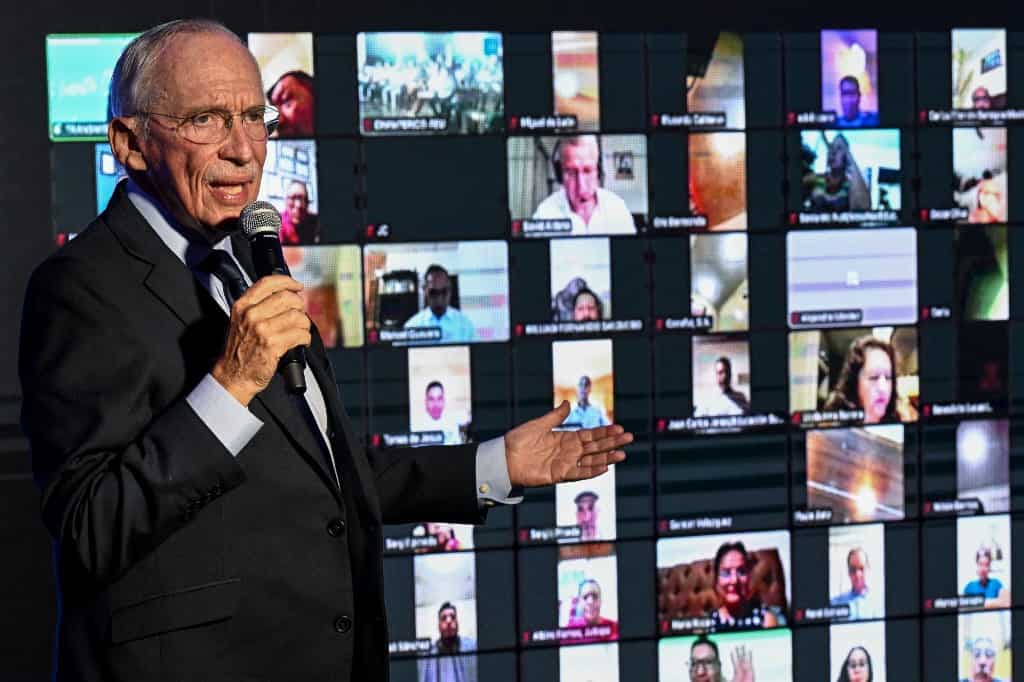Guatemalans go to vote Sunday with two popular candidates disqualified and several prosecutors and journalists detained or in exile amid a government pushback on anti-corruption efforts.
Twenty-two candidates are in the running with three in a clear lead: a former first lady, a UN diplomat, and an ex-dictator’s daughter. “All the candidates are the same and only come to rob (the people). I still don’t know if I’m going to vote,” said street vendor Nestor Figueroa in the capital Guatemala City.
Center-leftist Sandra Torres — the ex-wife of deceased former leftist president Alvaro Colom — leads with 21.3 percent, according to the most recent poll by the Prensa Libre newspaper, followed by centrist career diplomat Edmond Mulet with 13.4 percent.
In third place, with 9.1 percent, is right-winger Zury Rios, daughter of former military strongman Efrain Rios Montt. The candidate of President Alejandro Giammattei’s party, Manuel Conde, is fourth with 5.8 percent.
The polls indicate a high possibility that the election will go to a runoff on August 20, with no single candidate likely to obtain the 50 percent minimum share of votes required to win in the first round.
Two serious candidates have been ruled out of contention by the Superior Electoral Tribunal (TSE), in decisions critics have condemned as flawed.
Carlos Pineda, who was the poll favorite at the time, lost a Constitutional Court appeal in May against his disqualification by the TSE for alleged irregularities in the registration of his candidacy.
Also out of the running, over allegations of financial impropriety against her vice-presidential running mate, is Thelma Cabrera — a representative of the Mayan Indigenous group that makes up 40 percent of Guatemala’s population.
According to the Prensa Libre poll, distrust is high in the TSE and its perceived obscure decision-making, with more than one in ten saying they intended to cast a blank vote in protest.
Manipulated
Some 9.4 million of the country’s 17.6 million people are eligible to take part in the election to replace conservative Giammattei, accused of increasing authoritarianism.
About three-quarters of the population disapprove of his leadership of a country riddled with poverty, violence and graft. The country has a one-term presidential limit.
Observers, rights activists, Indigenous groups and candidate Mulet have criticized what they perceive as increasingly iron State grip on institutions in a bid to protect a corrupt system benefiting those in power.
Under Giammattei, several former prosecutors of the International Commission Against Impunity in Guatemala (CICIG), a UN-backed entity closed by the government in 2019, have been arrested or forced into exile.
Earlier this month, the founder of a newspaper critical of the government was sentenced to six years in prison on charges of money laundering dismissed as fake by press freedom groups.
The newspaper founded by Jose Ruben Zamora has been forced to close, and several of its journalists have fled the country. Giammattei’s Attorney General, Maria Consuelo Porras, is on a US list of “corrupt actors.”
“All state institutions, including the electoral (body), are being manipulated by powerful groups linked to corruption and traditional oligarchal power,” Edie Cux, director of the local chapter of NGO Transparency International, told AFP.
At stake Sunday, he added, was “the rule of law, democracy and all guarantees and freedoms for the entire population.”
Persecution
For his part, Mulet had warned in an interview that the country was “slowly sliding into an authoritarian model.”
“The persecution of media, journalists, justice operators, politicians… are worrying elements,” he said. Guatemala is one of the most unequal countries in Latin America, according to the World Bank.
More than half its inhabitants live in poverty and half of all children under five suffer from chronic malnutrition, according to the UN. Insecurity is another major election issue. Guatemala’s homicide rate is 17.3 per 100,000 inhabitants — almost three times the world average, according to the UN.
In 2022 there were 4,274 murders, half of them attributed to drug trafficking and gangs that are mainly engaged in extortion and contract killings.
Torres and Rios have both evoked the tactics of Nayib Bukele in neighboring El Salvador in his controversial “war” on gangs which has won him adoration at home but opprobrium abroad over rights concerns.
Thousands of Guatemalans flee the country every year in search of a better life abroad, many of them undertaking the dangerous, illegal journey to the United States only to be deported.
Polling stations will open at 7:00 am Sunday and close 11 hours later, with the first results expected within hours. There will also be voting for 160 members of Congress, 340 mayors and 20 delegates to the Central American Parliament.
Voting is not compulsory.






